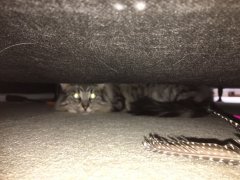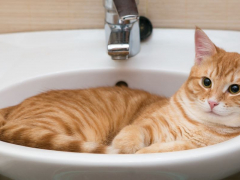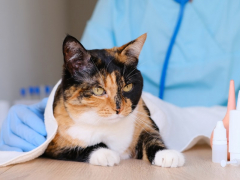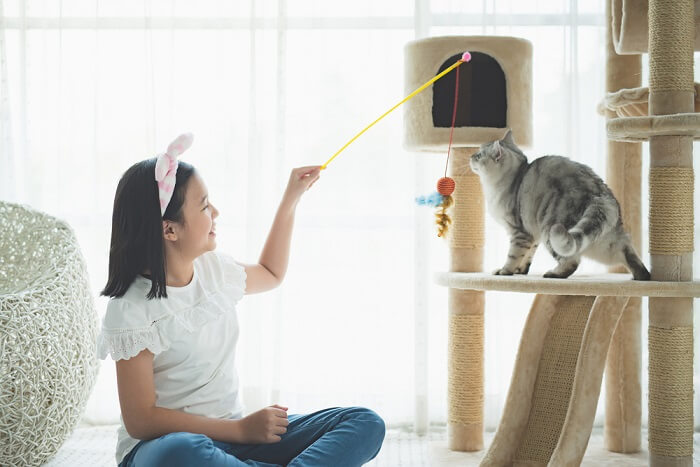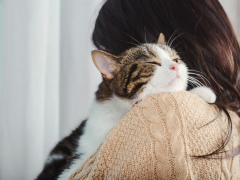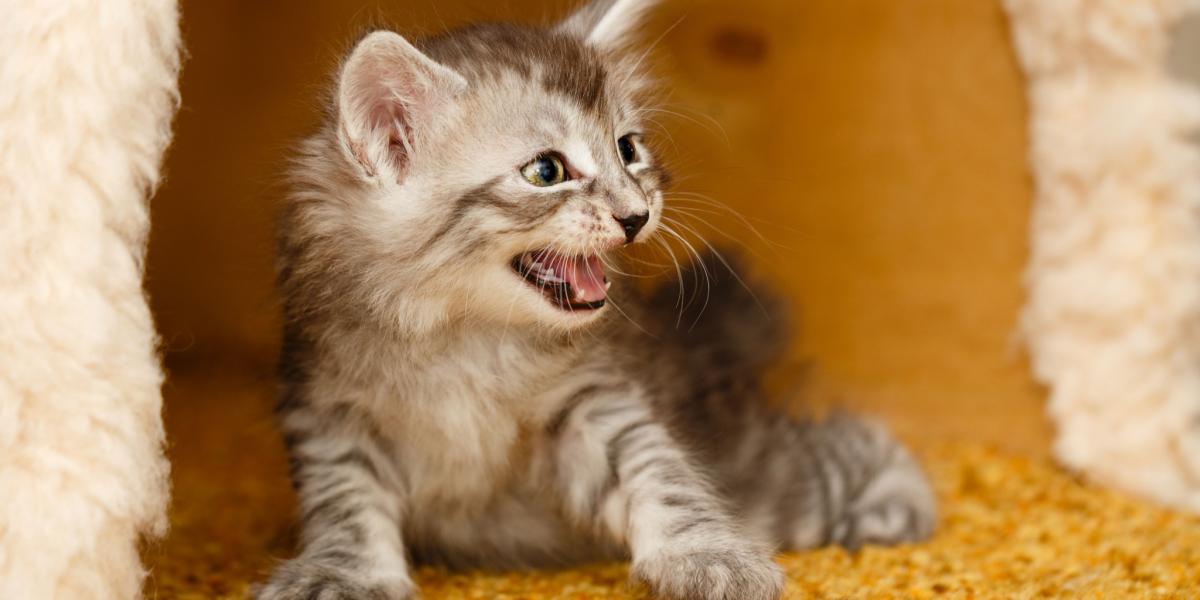
Cats are known to hiss at threats such as dogs or visitors they don’t like. But why do cats hiss at their own species? Why do cats even hiss at kittens, which appear to pose no threat?
Cats use vocalizations to express all manner of emotions like meows, chattering, purrs, and even hisses. In this article, you’ll find out why your cat might hiss at a kitten and if this is normal cat behavior.
Older cats hissing at a new kitten in the household is totally normal behavior. Cats usually stop hissing at a new kitten with time and a careful, gradual introduction. Giving your cat plenty of space, time, and positive reinforcement to get used to a new kitten will make for a smoother transition.Key Takeaways
Why Do Cats Hiss in the First Place?
We’ve all seen our cats hiss when an overly friendly Labrador has bounced up to them or when we’ve picked them up when they’re not in the mood.
A cat’s hiss can mean a variety of things. They might be downright annoyed and are sending you a warning signal to back off and give them space. A hiss might also mean that they are in pain (for example, because of arthritis). The hiss notifies someone or another animal that they feel upset. It also shows off their extremely sharp teeth, which can be a pretty scary threat.
Also Read: Cat Teeth Plaque & Tartar: Causes, Symptoms, & Treatment
Why Is My Cat Hissing at My New Kitten?
Cats are solitary and independent animals and hissing at new kittens is very normal. It might be triggered for a number of reasons, as described below.
1. Territory
Cats are very territorial animals. When they see a new animal on their turf, they make it clear that the older cat was here first. Cats spend time spreading their scent around their area, which includes your whole house and possibly the outside area.
Once a kitten arrives, their new smell feels like a threat has invaded the space. Your cat’s hiss at the intruder is a form of territorial aggression. For your older cat, have plenty of ‘their’ things in the same place with the same, familiar smell to comfort them while they get used to the newest member of the household.
2. Hierarchy
If your cat has been a solo cat for quite a while, they won’t want a new kitten to come in thinking they’re the boss. Your cat sets the hierarchy and hisses to warn the new kitten about who is in charge.
Kittens are notoriously playful and boisterous. For a reserved, older cat, this can be a little too much to handle sometimes. A quick hiss when the kitten has over-stepped the mark and annoyed the older cat is just a way of setting down the ground rules and forming boundaries.
3. Feeling Trapped
If cats feel boxed in when being introduced to a new kitten, it triggers their fight-or-flight response. If there’s no space for flight, then they resort to fight instead. A hiss indicates that their anxious about their situation and they want some space from the kitten.
Also Read: Why Do Cats Like Boxes? 8 Reasons Why!
What Should I Do if My Cat Starts Hissing at My Kitten?
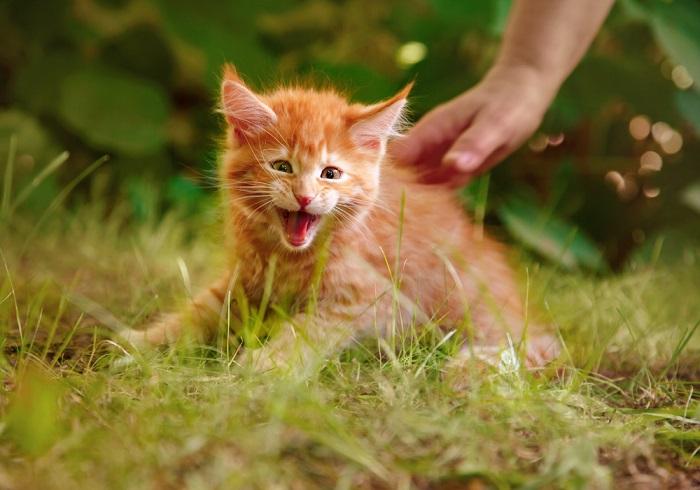
If you’ve recently adopted a new cat or kitten and notice a lot of hissing, give each cat a safe place to retreat and give it time.
A quick hiss is tolerable, but if your cat starts looking more confrontational and swats at the kitten, intervene and separate them. Don’t risk the kitten getting injured or causing either cat too much stress.
If your cat hisses at your kitten, give them an escape from the interaction. Allow them to run somewhere that feels safe, such as a beloved cat tree. Otherwise, take the kitten away to a closed-off area, separating the cats.
How Long Will My Cat Hiss at My Kitten?
When a new kitten arrives, it’s a huge adjustment for an older, established cat. Even if your older cat is usually very friendly, it takes time for them to get used to a kitten.
Expect a little adjustment time. If your cat hisses at the kitten repeatedly, even after two to three weeks, then it is time to intervene.
Also Read: How To Help Cats Get Along?
How To Stop an Older Cat From Hissing at a Kitten
If several weeks have passed, and your cat is still not getting along with the new kitten, there are some things you can do to help. Separate them for small periods throughout the day to give your older cat a break, so that they don’t get overwhelmed. Also, give them separate places to sleep.
Provide lots of facilities for your cat to ‘escape’ to that the kitten can’t reach. For example, a room that only they go to, high perches, or a cozy “cave” or hiding spot all their own.
Will My Cat Eventually Stop Hissing at the Kitten?
The majority of cats become acclimated to having a new cat around and stop hissing at them after about a week.
This is especially so when the kitten becomes more mature and is less likely to irritate the older cat. Once they are both in their new routine and used to sharing a space with each other, the hissing should stop.
If the hissing simply does not stop after a couple of weeks, seek the advice of an animal behaviorist.
Also Read: How To Introduce A New Kitten To An Older Cat
Do All Cats Hiss at Kittens?
Not all cats hiss at kittens, but it is not uncommon. If you know your cat is less tolerant of new animals or people, or they were rescued and have previous trauma, it is worth being extra careful when introducing a kitten to them. Take things slowly.
Some cats may accept a new kitten very quickly and not hiss at all. Whatever the case, continue to give your cat the same love and attention that you did before the new kitten showed up.
How To Get Your Cat Used to a New Kitten
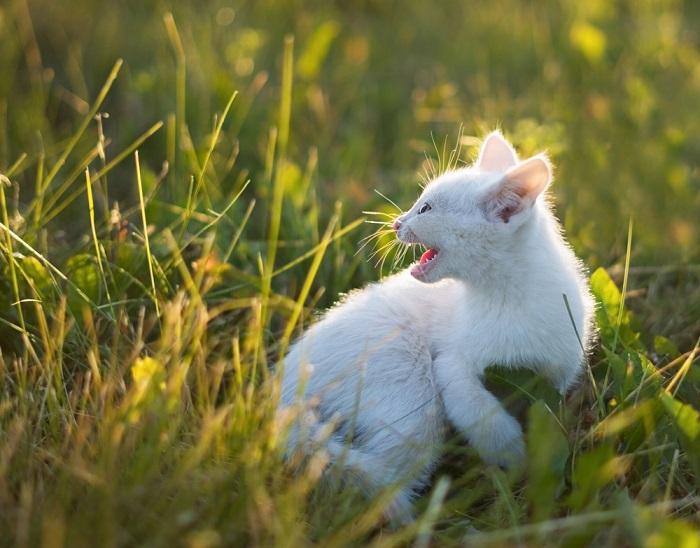
Introducing new cats to each other should be done slowly and with patience.
A week before bringing home a new kitten, get your cat used to the new toys and supplies for the new arrival. Being prepared ahead of time for the new pet will mean that you’re more relaxed. This in turn will mean that your cat will also be more relaxed.
When your kitten arrives, have a comfortable room ready for them to get used to the new home, away from the older cat. Keep them in this room for the first few days or for the first week. This allows your adult cat to get used to the sound and smell of the kitten without having to meet in the flesh.
Giving your cat some time to gradually become accustomed to a new animal in the house without direct contact will mean they are less likely to become highly stressed and lash out at the kitten.
Also Read: The 7 Best Cat Treats For Kittens
Final Thoughts
While it may take time for your older cat to stop hissing at the new kitten, with patience and persistence, your cat will calm down and grow used to the new member of the household. Keep the cat and kitten separate for a few days, and allow them to get used to each other’s scent without meeting directly.
When you do finally allow direct contact, let the cats get to know each other for short periods of time, which you can gradually increase if everything goes well. Make sure you give both the cat and kitten lots of space and positive encouragement with vocal praise or treats. If all else fails, seek out an animal behaviorist.
Also Read: Do Cats Get Lonely Without Other Cats?
Frequently Asked Questions
Is it normal for cats to hiss at kittens?
It is normal for cats to hiss when introduced to a new kitten. This is a very new scenario for the cat and they will feel undoubtedly a little stressed because of it. As long as the hissing doesn’t turn into aggressive behavior, it should eventually stop if you’ve introduced the cat to the kitten carefully and slowly.
Should I let my cat hiss at the new kitten?
A few small hisses should be expected and allowed. However, if the hissing becomes very prolonged and starts looking like it’s turning into aggressive behavior, give your cat a break and separate them from the kitten for a while.
Do mother cats hiss at kittens?
Mother cats may hiss at their kittens when they’re really young if they stray outside the nest she’s created for them. She won’t want them putting themselves in potential danger as prey where she can’t save them from a predator, especially if she’s leaving them to go eat.
How long does it take for a cat to stop hissing at kittens?
As long as you’ve been careful and thoughtful when introducing your cat to a kitten, they should stop hissing at them usually after no more than three weeks. Once you’ve not noticed your cat hiss at the kitten for a full week, you should be in the clear and you can let them socialize with each other freely with less supervision.
Will an older cat hurt a kitten?
If an older cat feels extremely threatened by a kitten due to territorial or behavioral reasons, they might hurt the kitten. When a cat makes a hissing sound at a kitten, reading a cat's body language can give away if they might actually hurt the kitten as well.
A cat swat can cause injuries with their sharp claws, especially a scratch to the eyes. If the situation is not diffused, the cat might resort to even more aggressive behavior and bite the kitten. If you are worried that your kitten has been scratched or bitten by an older cat, please always consult your veterinarian.

